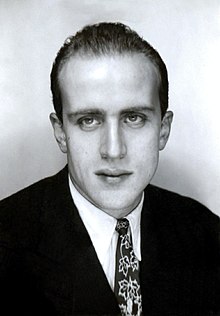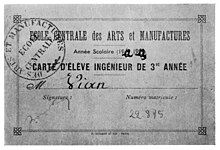Boris Vian
Boris Vian (born March 10, 1920 in Ville-d'Avray , † June 23, 1959 in Paris ) was a French writer , jazz trumpeter , chansonnier , actor , translator , essential member of the Collège de 'Pataphysique and head of the jazz record department at Philips . Initially forgotten a little after his death, he is today again one of the most interesting artists of the French post-war period.
Life and work
Vian spent his childhood in the Parisian villa suburb of Ville-d'Avray as the younger son of Paul Vian, a wealthy citizen who was allegedly a bronze manufacturer, but actually made his fortune by trading gold. As in the Great Depression in the early 1930s these businesses collapsed and Vian nearly went bankrupt, the family had to move into the gardener's cottage of the estate. The villa was rented by the parents of the future violin virtuoso Yehudi Menuhin , who became Vian's playmate. For his part, Vian learned to play the trumpet.
As an adolescent, he suffered a typhoid infection , which caused permanent damage to the heart muscle. After first attending the Lycée Hoche in Versailles , he switched to the Lycée Condorcet , one of the best high schools in Paris. Here, after completing his baccalaureate, he went through the preparatory classes ( Classes préparatoires ) for the École Centrale Paris , the renowned Parisian state technical college. In 1939 he passed the entrance examination (Concours) and began studying engineering.
In June 1940 the Vians fled from the "blitz allemand" to their holiday home on the Atlantic coast, where other wealthy Parisian families had also sought refuge. At the parties with which the young people passed the time here, Vian met Michelle Léglise, whom he married in 1941 and with whom he had two children in the following years (the marriage was divorced in 1952). After returning to occupied Paris, which was functioning more or less normally, he graduated in 1942 and received a post at the Association française de normalization , the French standardization organization . Here he learned what bureaucracy is, but also had leisure time for literary activities, e.g. B. a first novel, Vercoquin et le Plancton , or poetry ( Cent sonnets ).
In 1944 his father Paul Vian was murdered by burglars. After the liberation of Paris in August 1944, Vian gained contact with intellectual circles and belonged to a. for some time to the closer circle around Jean-Paul Sartre , until he annoyed him by a love affair with his (Vian's) wife and his authoritarian behavior.
In 1947 he gave up his salaried post and wrote as a journalist for various magazines, in particular a regular ironic Chronique du menteur (Chronicle of the Liar) in Sartre's Les Temps modern . He also worked as a translator from American and as a critic for jazz music. In the evenings he played the trumpet in a jazz cellar in Saint-Germain.
In 1947 he became famous for the scandal surrounding the short novel J'irai cracher sur vos tombes ( I will spit on your graves ), the alleged translation of a sex-and-crime novel by an alleged African-American author, published in 1946 Vernon Sullivan. The work, written as a pastiche on the basis of a bet , which contained exaggerated brutalities and deliberate inconsistencies, was taken seriously thanks to its sales success and earned Vian an indictment and conviction of immorality. At the same time it threatened to fix its image in a certain direction, especially since in 1947, 1948 and 1950 he added three (only moderately successful) more "Sullivans".
Also in 1946, his best-known work, the little novel L'Écume des jours (Eng. The foam of the days ), a surrealist alienated, elegiac-tragic love story, was published. L'Écume was initially unsuccessful, perhaps also because of the Sullivan affair, but in the 1960s / 1970s it developed into a cult book for a whole generation of young readers.
Vian's other novels, L'Automne à Pékin (Autumn in Beijing, 1946), L'Herbe rouge (The Red Grass, 1950) and L'Arrache-cœur (The Heart Runaway, 1954), as well as his stories, were unsuccessful in the long term , probably because they don't have a classic plot and are overloaded with play on words and other gags. In the early 1950s he gave up writing novels.
From 1951 Vian wrote numerous texts for the radio. In 1958 he worked with Darius Milhaud on the opera Fiesta . He translated books by Raymond Chandler and AE van Vogt into French and was involved as a musician and music critic in the reception of American pop culture in France.
Vian's first pieces were almost unsuccessful: Équarrissage pour tous (covering for everyone; 1947, premiered 1950), a grotesque tragedy with which the author reacted to the beginning of the Cold War and warned of a third world war; or Le Goûter des généraux (The Generals' Fork Breakfast ; 1950, premiered 1951), in which he castigates the irrational and ridiculous motives with which the French government and generals plunged the country into colonial wars , especially the Indochina War (1946–54) had. Only Les bâtisseurs d'Empire (Die Reichserbauer; 1957, premiered posthumously 1959), a seemingly absurd but de facto political piece that deals with the effects of the war in Algeria that broke out at the end of 1954 on France itself, where many are moderately left-wing , had a certain success Intellectuals feared a shift to the right, if not a right-wing military coup (which almost seemed to come about in May 1958).
Around 1950 Vian wrote numerous poems on the subject of partnership problems. In 1952 his marriage ended in divorce after his wife became Sartre's lover . In 1954 he married his second wife Ursula Kübler , the daughter of the Swiss writer Arnold Kübler . The poems in question were collected in Cantilènes en gelée (Kantilenen in Aspik, 1949) and Je voudrais pas crever (I don't want to die, 1953). A number of his 400 or so poems also apply to politics in France during the Fourth Republic, which around 1945 experienced an enormous atmosphere of optimism, but then sank into a permanent crisis from 1950 under the pressure of the non-stop colonial wars, which both frustrated and polarized the French.
In this context, Vian achieved another scandalous success in 1954 when he sang the chanson Le déserteur (The Deserter), a pacifist song in which he addressed the French defeat in the Battle of Điện Biên Phủ during the Indochina War and the partial mobilization of the French army called for deserters in the Algerian war , which aroused the wrath of nationalists and the judiciary. Le déserteur was banned in 1955.
In 1956, an acute pulmonary edema forced Vian to take a spa stay in St. Tropez . After another collapse in 1958, Vian died in 1959 during a preview of the film, which was shot against his will - because it deviated from its script - based on the novel J'irai cracher sur vos tombes (directed by Michel Gast ). He had reluctantly let himself be dragged along by acquaintances and was apparently so excited that his ailing heart gave out.
Vian was working at the time as the artistic director of the Philips record department .
Vian as a jazz musician
Even during the German occupation, he played the jazz music that was outlawed by the Germans in the Tabou Club on Rue Dauphine in Saint-Germain-des-Prés in Paris. He played a small pocket trumpet, which he describes in poems as a "trompinet". He became a member of Claude Abadie's jazz band , which caused a sensation in the scene; later he played with Hubert Fol and Claude Luter . Serge Gainsbourg said he was inspired to write music when he saw Vian live.
In 1948 the doctor forbade Vian to play the trumpet, which he occasionally ignored. As a jazz enthusiast, he served as a liaison in Paris for American musicians such as Duke Ellington and Miles Davis . He wrote for various French jazz magazines ( Jazz Hot , Paris Jazz ) and published countless articles on jazz in both France and the USA. Although he has never visited them, they are directly and indirectly very present in his work, just like jazz.
He also wrote chansons and performed them. His chansons have also been recorded by other artists, including a. Juliette Gréco , Nana Mouskouri , Yves Montand , Magali Noël and Henri Salvador .
Movie
Vian was occasionally hired as an actor, for example in Roger Vadim's literary adaptation Dangerous Liaisons ( Les Liaisons dangereuses ) from 1959. He also worked several times with Michèle Arnaud and Raymond Queneau on film projects.
reception
Texts by Vian were often indexed because he very often and sharply expressed his pacifist views and criticized the government and the military during the French colonial wars (1946–1962). Because of his fondness for word games of all kinds, his novels and plays are also difficult to translate, which limited Vian's reception outside of the French-speaking world.
Today he is considered a cult author. His novels, which were hardly noticed at the time, especially The Foam of the Days (L'Écume des jours) , are among the classics of French post-war literature. According to Le Monde of December 25, 2007, more than 100,000 copies of his books are constantly being printed each year.
German translations of Vian's novels were published in 1964–1966 by Karl Rauch Verlag in Düsseldorf . They were reprinted in a new translation in 2003 by the Berlin publishing house Wagenbach. In addition, the publishing house Zweiausendeins edited a complete edition of his works; Art Spiegelman designed the covers .
Vian is considered a major protagonist of existentialism .
Since 1972 the “ Académie du Jazz ” has awarded the French jazz prize Prix Boris Vian named after the author .
The international circle of authors Oulipo , which was founded in 1960 by mathematician François Le Lionnais and writer Raymond Queneau , completed Vian's novel On n'y échappe pas ( Éditions Fayard , 2020), which has remained fragmentary .
Works
Novels, short stories, poetry (selection)
- Trouble dans les Andains (1942) (German: Rebellion in the Andennes, ISBN 3-8031-2243-0 )
- L'Arrache-coeur (1942) (German: Der Herzausreißer, ISBN 3-8031-2257-0 , first published by Karl Rauch Verlag, Düsseldorf 1966)
- L'Écume des jours (1946) (German: The Foam of the Days. ISBN 3-8031-1177-3 , first published by Karl Rauch Verlag, Düsseldorf 1964 as Chloé . Again: The Foam of the Days. Neu-Übers., Nachw . Frank Heibert . Wagenbach-Verlag , Berlin 2017)
- L'Automne à Pékin (1946) (German: Autumn in Beijing, ISBN 3-8031-2271-6 , first published by Karl Rauch Verlag, Düsseldorf 1965)
- Vercoquin et le plancton (1946) (German: Drehwurm, Swing and the Plankton, ISBN 3-8031-2249-X )
- Cantilènes en gelée (Poems) 1949
- Les Fourmis (1949) (The ants and other short stories ISBN 3-8031-1126-9 )
- L'Herbe rouge (1950) (German: The red grass, ISBN 3-8031-2233-3 )
- Le Ratichon baigneur (1950)
- Visite chez Camille Bombois , maître des poids et maître de la toile (1952) (German: visit to Camille Bombois. Boris Vian visits a fairground artist and old school artist . Piet Meyer Verlag, Bern 2012, ISBN 978-3-905799-21 -7 )
- La messe en Jean Mineur by JS Bachique , private print, Paris, 1957 (69 copies)
- German / French / English: Pornographic opportunities / Écrits Pornographiques from the French by Klaus Völker and Stanley Chapman , Verlag Klaus G. Renner, Zurich (99 copies) 2011 ISBN 978-3-927480-63-6
- Le Loup-garou ( volume of novels, 1970)
- Les Bâtisseurs d'empire
Under the pen name Vernon Sullivan :
- J 'irai cracher sur vos tombes (1946) (German: I'll spit on your graves, ISBN 3-8031-2240-6 )
- Les Morts ont tous la même peau (1947) (Dead people all have the same skin, ISBN 3-8031-2244-9 )
- Et on tuera tous les affreux (1948) (We'll kill all nasties, ISBN 3-8031-2406-9 )
- Elles se rendent pas compte (1950) (German: They don't understand , ISBN 3-8031-2258-9 )
Plays
- Équarrissage pour tous ( covering for everyone ; 1947). Premiere 1950
- Le Goûter des généraux ( The Generals' Fork Breakfast ; 1950). Premiere 1951
- Paris varie ou fluctuat nec mergitur . 1952
- Les Bâtisseurs d'Empire ou Le Schmürz ( Die Reichserbauer ; 1957). Premiere 1959
Libretti
- Fiesta . Opera. Music (1958): Darius Milhaud . Premiere 1958.
- L'écume des jours , opera. Music (1986): Edisson Wassiljewitsch Denissow . Premiere: Paris, Opéra-Comique 1986
Chansons
- Le déserteur ( The deserter ; 1954)
- The jardins de banlieue
Audio book
- Boris Vian: Foam of the days. Christoph Merian Verlag, Basel 2008, ISBN 978-3-85616-390-7
Radio play adaptations
- 2003: Boris Vian: The dead all have the same skin . Director: Regine Ahrem , translation: Asma Semler. 48 minutes, RBB.
- 2004: Boris Vian: I will spit on your graves. Director: Igor Bauersima , translation: Eugen Helmlé , contributors: Igor Bauersima, Dominique Horwitz , Katharina Burowa , Bettina Kurth , Birgit Stöger , 86 minutes, DLR / WDR.
- 2004: Boris Vian: Das Rote Gras - adaptation and direction: Christiane Ohaus (radio play - DLR Berlin / NDR)
Film adaptations
The Foam of the Days has been filmed four times:
- 1968: L'Écume des jours (Director: Charles Belmont)
- 1993: The Foam of the Days (Director: Michael Groote)
- 2001: Kuroe (Director: Gô Rijû)
- 2013: L'Écume des jours (Director: Michel Gondry )
literature
- Klaus Völker : Boris Vian. The Prince of Saint Germain. Wagenbach, Berlin 2006, ISBN 3-8031-2529-4 .
- Martin Weiss: Boris Vian - La langue qui trébuche. Jeux de mots in l'oeuvre d'un génie. Graz Linguistic Studies 20, University of Graz 1983, new edition (as eBook) 2014.
- Boris Vian: the deserter. Chansons, satires and stories. Wagenbach, Berlin 1992 (with a biographical portrait of Klaus Völker).
- Phillippe Boggio: Boris Vian. Flammarion, Paris 1993.
- German by Hinrich Schmidt-Henkel : Boris Vian. Biography. Rowohlt, Reinbek 1997, ISBN 3-499-13972-3 .
- Gert Pinkernell : Boris Vian's tragic grotesque “Les bâtisseurs d'Empire” as a chronicle of the Guy Mollet era 1956–1957. In: Ders .: Interpretations. University Press C. Winter, Heidelberg 1997.
- Alfred Hahn-Birkner: Boris Vian in Germany. A reception analysis. Diss. Phil. University of Kiel 1989.
- Boris Vian. In: Paris 1944–1962. Poets and thinkers on the street. Edited by Bernd Wilczek. Elster, Zurich 1998, ISBN 3-89151-301-1 (especially as a chansonnier).
Movies
- Boris Vian - A Wild Life in Saint-Germain. Documentation, France, 2009, 59 min., Script and direction: Philippe Kohly, production: Camera Lucida Productions, arte France, summary by arte
- Parisian air with Boris Vian. Musik-Revue, France, 2009, 90 min., Directors: Marc Hollogne, dialogues: Marc Hollogne, Marie-Pierre Farkas, production: ARTE France, summary by arte
Video
- Les frères Vian "Sheikh of Araby" in the archive of the Institut national de l'audiovisuel (INA)
Web links
- Literature by and about Boris Vian in the catalog of the German National Library
- Works by and about Boris Vian in the German Digital Library
- Boris Vian in the Internet Speculative Fiction Database (English)
- Boris Vian in the Internet Movie Database (English)
- Names, Titles and Dates of French Literature, by Gert Pinkernell
- What is Pataphysics?
- "Le Déserteur" with translations in 39 languages , site "Anti-War Songs", e.g. B. en , fr , it
- The deserter, German text. Info
- 13 indecent stories at Die Zeit
- Biography, bibliography, analysis (French)
- Boris Vian, j'irai chanter sur vos tombes Site-conférence, "Hall de la Chanson" (French)
- Schaal zu Vian as a jazz author
- Extraits musicaux «The Deserter» & Discographie complète de Boris Vian (French)
- Boris Vian - jazz, Paris, chansons and literature. Detailed portrait
- Boris Vian - site officiel Official site in French.
Individual evidence
- ↑ a b c d Thierry Raboud: Écrire noir sur Vian - Né il ya cent ans, l'écrivain vibrionnant a laissé l'ébauche d'un polar si bon qu'il s'en etonnait lui-même. Six facétieux l'ont achevé sous la contrainte . In: La Liberté . No. 90/148 . Friborg January 19, 2020, p. 32 .
| personal data | |
|---|---|
| SURNAME | Vian, Boris |
| ALTERNATIVE NAMES | Sullivan, Vernon (pseudonym) |
| BRIEF DESCRIPTION | French writer, engineer, jazz trumpeter, chansonnier, actor and translator |
| DATE OF BIRTH | March 10, 1920 |
| PLACE OF BIRTH | Ville-d'Avray |
| DATE OF DEATH | June 23, 1959 |
| Place of death | Paris |




